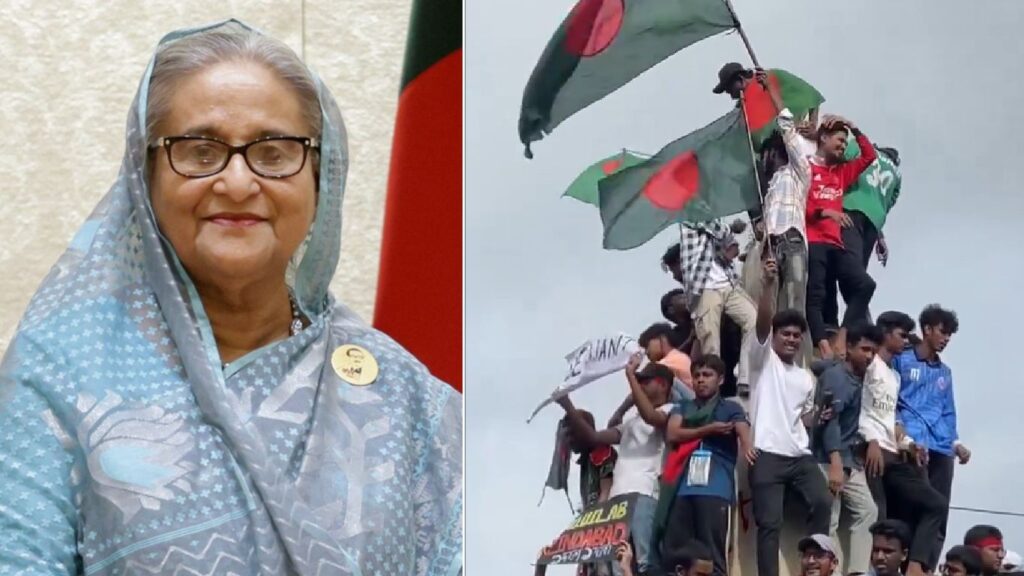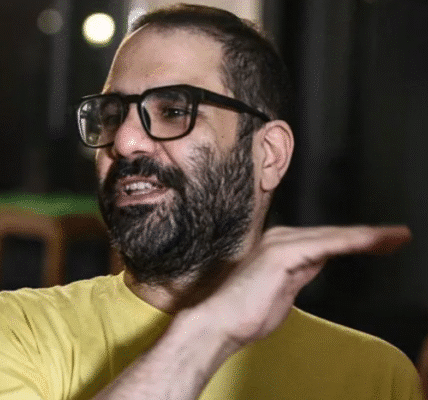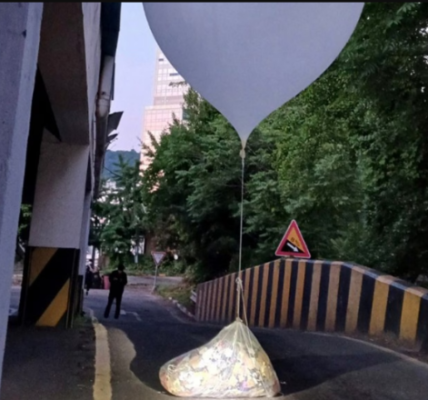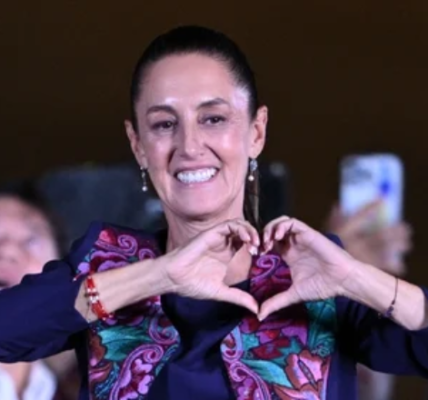Sheikh Hasina Resigns Amid Protests: Nobel Laureate Muhammad Yunus Poised to Lead Interim Government in Bangladesh
In a dramatic turn of events, Bangladesh Prime Minister Sheikh Hasina resigned on Monday amid escalating protests, marking a significant shift in the country’s political landscape. The resignation came as a surprise to many, as Hasina has been a dominant figure in Bangladeshi politics for decades. Her departure has sparked a series of reactions and developments both domestically and internationally.

Resignation and Immediate Developments
Sheikh Hasina arrived at the Hindon Air Base near New Delhi aboard a C-130 Hercules military transport aircraft, seeking temporary refuge in India. This move followed intense demonstrations primarily led by students. The protests initially called for the abolition of a controversial quota system for government jobs, which reserved 30% of positions for families of veterans who fought in the 1971 liberation war. However, the movement quickly escalated into a broader uprising against Hasina and her ruling Awami League party.
All-Party Meeting in India
In response to the unfolding situation, Indian leaders Mallikarjun Kharge (Rajya Sabha) and Rahul Gandhi (Lok Sabha) attended an all-party meeting convened by the central government on Tuesday. External Affairs Minister S. Jaishankar briefed the attendees on the developments in Bangladesh, highlighting the potential regional implications of Hasina’s resignation.
Violence and Unrest
The situation in Bangladesh has been marked by significant violence and unrest. On Sunday, clashes in Dhaka resulted in at least 95 deaths, including 14 police officers, and left hundreds more injured. The Bangladeshi newspaper Prothom Alo reported that agitators set fire to the Awami League’s Dhaka district office and Sheikh Hasina’s office in Dhanmondi, Dhaka. Protesters were seen chanting slogans and celebrating Hasina’s resignation, underscoring the intensity of the public’s dissatisfaction.
Statements from Key Figures
Sajeeb Wazed Joy, Sheikh Hasina’s son, stated that there was no pressure from the army regarding his mother’s resignation. He emphasized that it was her decision to avoid using force against the protesters. Meanwhile, sources close to the opposition in Bangladesh reported that the United States had revoked Hasina’s visa, signaling international ramifications of the domestic turmoil.
Formation of Interim Government
Amid the chaos, Nobel laureate Muhammad Yunus expressed his readiness to head an interim government in Bangladesh. Yunus, a prominent figure known for his work in microfinance and poverty alleviation, stated, “I am honored by the trust of the protesters who wish for me to lead the interim government. If action is needed in Bangladesh, for my country and for the courage of my people, then I will take it.” This development followed a meeting between Bangladesh President Mohammed Shahabuddin and key coordinators of the student movement to discuss the current situation and the shape of the interim government.
Security Measures and International Concerns
The situation in Bangladesh prompted significant security measures along the India-Bangladesh border. BSF Director General (Acting) Daljit Singh Chawdhary reviewed the security situation at the Petrapole border in North 24 Parganas district. The BSF issued a “high alert” across all its formations along the 4,096-km border. European Union diplomats also expressed concern over reports of attacks on minority groups in Bangladesh following Hasina’s resignation. EU Ambassador to Bangladesh Charles Whiteley posted on social media that the EU heads of mission were “very concerned” about incoming reports of multiple attacks against places of worship and members of religious, ethnic, and other minorities.
Transportation and Logistical Changes
The unrest in Bangladesh led to significant disruptions in transportation. Air India announced the resumption of flight operations to Dhaka, offering a one-time waiver on rescheduling tickets for customers due to the prevailing situation. However, services of the Kolkata-Dhaka-Kolkata Maitree Express remained suspended, highlighting the ongoing instability in the region.
Statements from International and Domestic Leaders
UN Secretary-General Antonio Guterres called for calm and restraint from all sides, emphasizing the importance of a peaceful, orderly, and democratic transition. Guterres expressed his concern over the loss of life during the protests and highlighted the need for a peaceful resolution to the crisis. Meanwhile, exiled author Taslima Nasreen commented on the irony of the situation, noting that the same Islamists who forced her out of Bangladesh in the 1990s were now causing Hasina to flee.
Situation in Dhaka
Despite the chaos, there were signs of the situation stabilizing in Dhaka. Visuals showed traffic movement returning to normal in the Azimpur area of the city. Critical patients from Bangladesh were being transferred to India for treatment at the Petrapole border, underscoring the ongoing humanitarian impact of the crisis.
Future Developments
External Affairs Minister S. Jaishankar informed the Indian Parliament that India has been in regular touch with authorities in Dhaka and the Indian community in Bangladesh. He noted that approximately 19,000 Indian nationals, including 9,000 students, were in Bangladesh, with the majority of students having returned to India by July. Jaishankar also mentioned that Hasina’s resignation followed a meeting with leaders of security establishments, and at very short notice, she requested approval to come to India.
Political and Social Implications
The resignation of Sheikh Hasina marks a pivotal moment in Bangladesh’s political history. It highlights the deep-seated dissatisfaction with her government and the broader political establishment. The protests, led primarily by students, reflect a significant shift in the country’s social dynamics and the increasing role of youth in shaping Bangladesh’s future.
Nobel Laureate Muhammad Yunus’ Role
Muhammad Yunus’ potential role as head of an interim government signifies a move towards a more inclusive and transparent governance model. Yunus, known as the “banker to the poor,” has a strong reputation for his work in poverty alleviation and economic development. His leadership could bring a new approach to governance in Bangladesh, focusing on social justice and economic empowerment.
Conclusion
As the situation in Bangladesh continues to evolve, the international community remains watchful of the developments. Sheikh Hasina’s resignation has triggered a series of political, social, and economic shifts in the country. The formation of an interim government, led by figures like Muhammad Yunus, could pave the way for a more democratic and inclusive future for Bangladesh. However, the path ahead remains uncertain, with significant challenges to overcome in restoring stability and ensuring the safety and well-being of all citizens.





